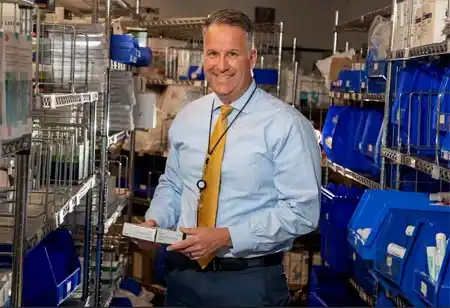Thank you for Subscribing to Healthcare Business Review Weekly Brief

Balancing Quality and Efficiency in Healthcare Supply Chains
Healthcare Business Review
Don Ecker's career journey reflects his diverse experiences in addressing supply chain management issues. At Holy Name Medical Center, he navigates the procurement operations for various clinical and procedural units. Ecker's extensive experience allows him to work collaboratively with clinical coordinators and physicians to address concerns and ensure optimal supply availability.
In an interview with Healthcare Business Review, Ecker sheds light on the intricate world of managing healthcare supplies. He shares his insights on pioneering innovative strategies for maintaining a streamlined healthcare supply chain.
What challenges do you encounter as the executive director of supply chain?
One of the perpetual challenges we navigate revolves around our distinct status as a standalone, independent entity within the industry, surrounded by multiple expansive IT systems and networks. Our commitment to standardization is crucial to remain competitive in terms of pricing. Standardization empowers us to attain pricing levels that are on par with our competitors.
Ensuring alignment with our pricing structures and processes when new and existing physicians seek change is undeniably a factor that occupies my thoughts. This task requires constant communication and coordination with our physicians to inform them of our objectives and methodologies and the strategic steps we are undertaking to sustain our positive operational trajectory.
How do you ensure a balance between cost efficiency and delivering high-quality medical supplies?
Our approach is simple. We only use medical devices that have proven clinical outcomes. We don’t stock new devices unless they show clear improvement over the existing ones. We always communicate with our physicians and ask them to provide evidence and data demonstrating the proven track record and superior efficiency of a new device compared to established options. We don’t accept requests based on novelty or preference. We limit our use of new devices to those that have solid, peer-reviewed, and accepted clinical data.
Could you elaborate on how you ensure essential medical supplies are available while minimizing excess stock?
Our approach centers on utilizing a perpetual inventory system with the Allscripts software.
We do cycle countings regularly, and we have a system in our procedure areas that help us to track the items used by the nurses and updates the inventory in real-time. We monitor the inventory levels daily and adjust them according to the demand and the surgery schedule. We run reports to check the par levels and ensure we are not overstocking or understocking.
Please walk us through any recent initiatives or projects you've been working on.
We are working on transitioning our purchasing system from Allscripts to a new platform. This transition is driven by our determination to enhance operational efficiency, primarily focusing on streamlining the requisitioning, approval, and receipt processes for equipment and supplies. A challenge we have identified is ensuring seamless tracking of deliveries and comprehending the movement of products throughout their journey. We acknowledge that the key lies not only in possessing the products but also in facilitating their timely and accurate distribution.
Don’t be Afraid of your Physicians. Engage Openly with Clinicians, Nurses, And Physicians. They are your Best Source of Information and Feedback, And they Provide Valuable Insights and Ground-Level Perspectives
This endeavor is crucial for the optimal functioning of our supply chain, ultimately ensuring that end users receive their requisites promptly.
How do you stay abreast of significant trends and advancements as the director of supply Chain?
First and foremost, staying informed requires close collaboration with physicians and understanding their vision for the future. Attending conferences and conducting research aligns with evolving trends. Additionally, staying attuned to reimbursement changes and profitability areas helps anticipate supply chain shifts. AI will play an important role in helping us analyze trends, sources, gaps, and data in the supply chain, both externally and internally. We need to be prepared and use it to improve our supply chain performance.
What advice would you offer to your peers and colleagues in the industry?
Don’t be afraid of your physicians. Engage openly with clinicians, nurses, and physicians. They are your best source of information and feedback, and they provide valuable insights and ground-level perspectives. You can work with them to support and improve the supply chain in a collaborative way rather than a confrontational one.









